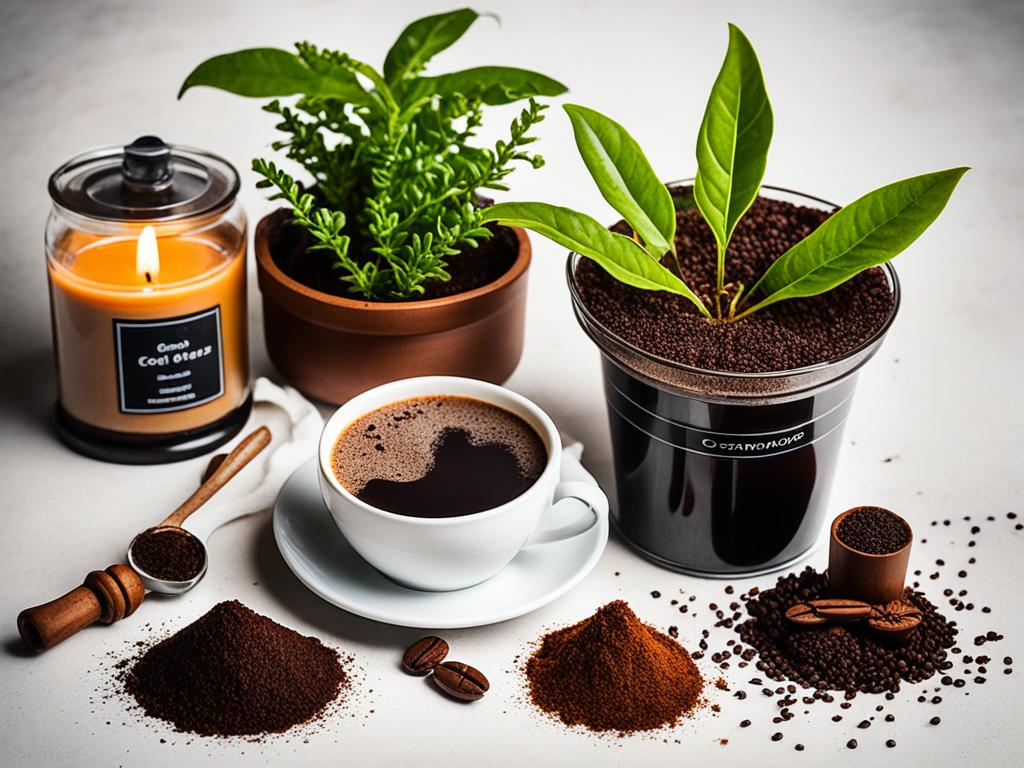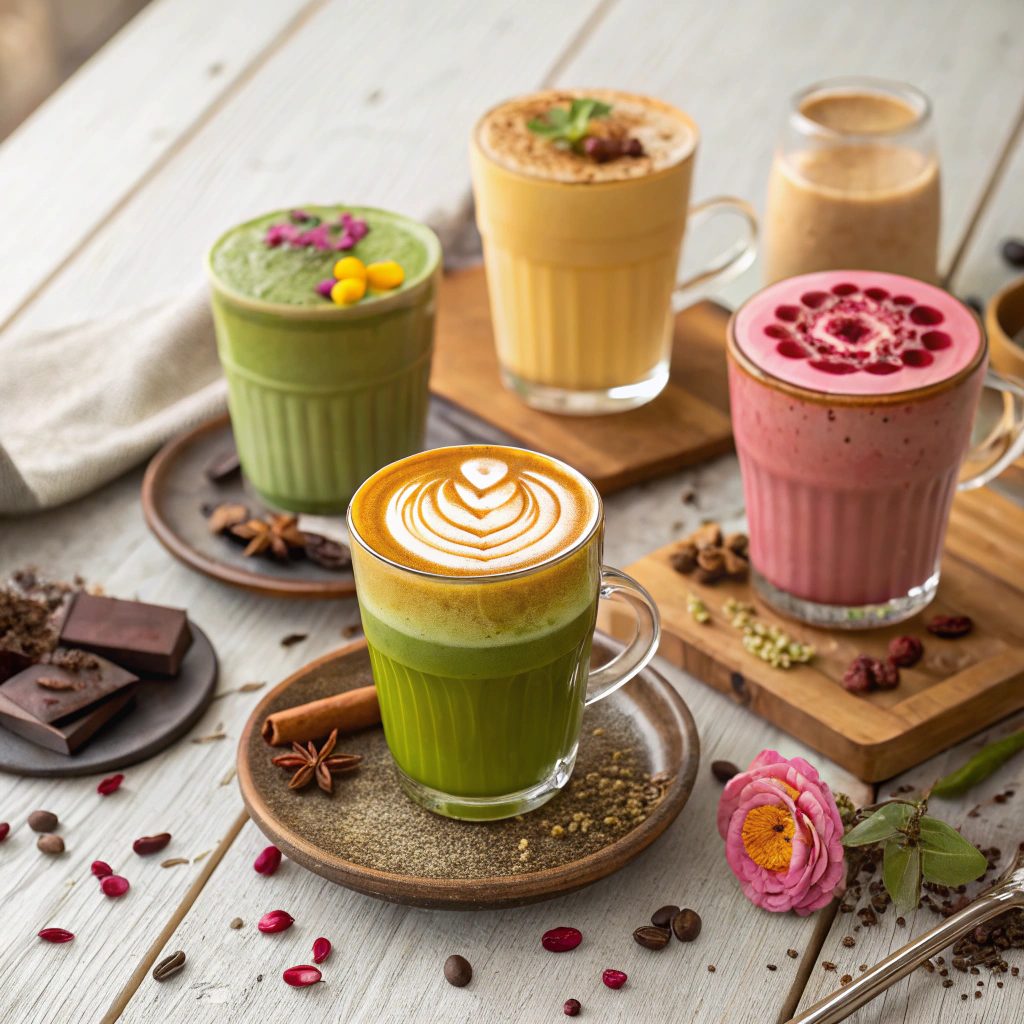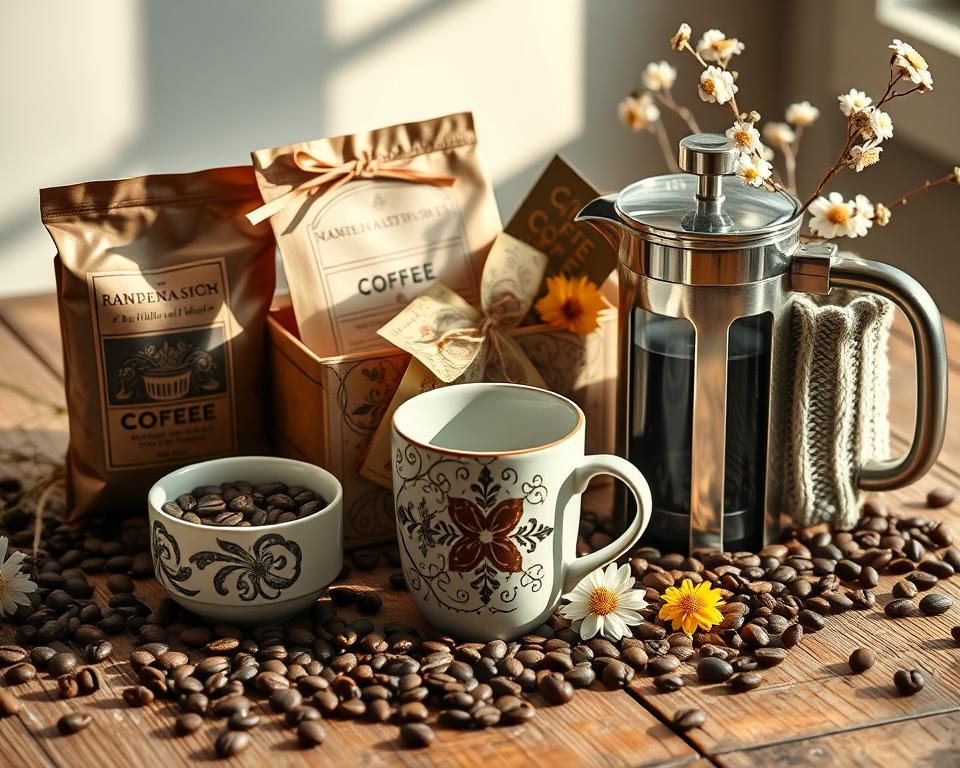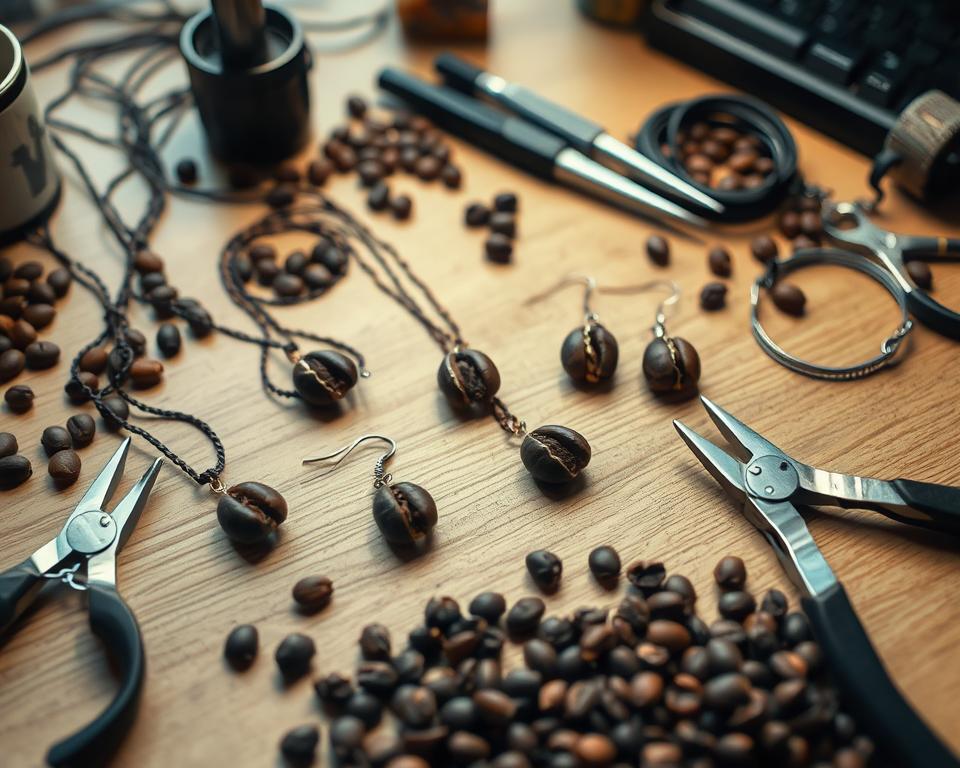Ever thought your morning coffee could lead to a greener garden or a fresher home? Imagine finding out that old coffee beans are a treasure for DIY enthusiasts. If you love the environment or want to save money, I have cool tips on using those beans.
My kitchen drawer was once full of unused, stale beans. Then, I discovered their power to uplift my daily life. Beyond just composting, old coffee beans are a treasure for home and garden care. Stay with me, and I’ll share some amazing ways to reuse those old coffee beans.
At first, I was doubtful about these ideas. But then, I was amazed by their many uses. From tenderising meat naturally to breathing new life into old wood, coffee grounds are surprisingly versatile. Have you tried any of these coffee bean DIY projects yet?
Key Takeaways
- Fertilize your garden with used coffee grounds to enrich the soil with organic material and protect against pests.
- Eliminate strong odours from your hands naturally after cooking with pungent ingredients like onions or garlic.
- Create savoury, tender meats by incorporating dried coffee grounds into a DIY dry rub for your next BBQ.
- Enjoy a cleaner fireplace by using damp coffee grounds to simplify ash cleanup.
- De-ice sidewalks with coffee grounds for improved traction and safety in frosty conditions.
- Deodorize your refrigerator effectively with a dish of dried coffee grounds to absorb any lingering smells.
- Turn your creativity up a notch by giving paper an aged, antique appearance with a simple coffee ground mixture.
Understanding the Potential of Expired Coffee Beans
A fresh cup of coffee makes mornings better. But when beans get old, their taste changes. Even though we love our coffee fresh for its best taste, old beans have potential too.
They can be recycled or used in sustainable ways, giving life to new ideas.
The Shelf Life of Coffee Beans
Did you know people enjoy between 400 billion and 1 trillion cups of coffee a year? This shows how important coffee is every day. But what about the beans that are no longer fresh? While they don’t go bad like other foods, their taste changes.
Yet, these expired beans are not useless. They can be used in creative ways, adding value even without their peak flavour.
Nutrient Profile of Old Coffee Beans
Repurposing old coffee beans is about being smart and sustainable. Coffee grounds are full of nutrients, like nitrogen, calcium, and potassium. These are great for the garden because they help the soil.
But remember, too much can be harmful. They should only make up 20% of your compost mix to avoid issues like soil acidity or holding too much water.
Old coffee beans have other cool uses too. They can help your hair grow or even keep bugs away. So, think twice before throwing out those expired beans.
There are many sustainable ideas to try for your garden and home.
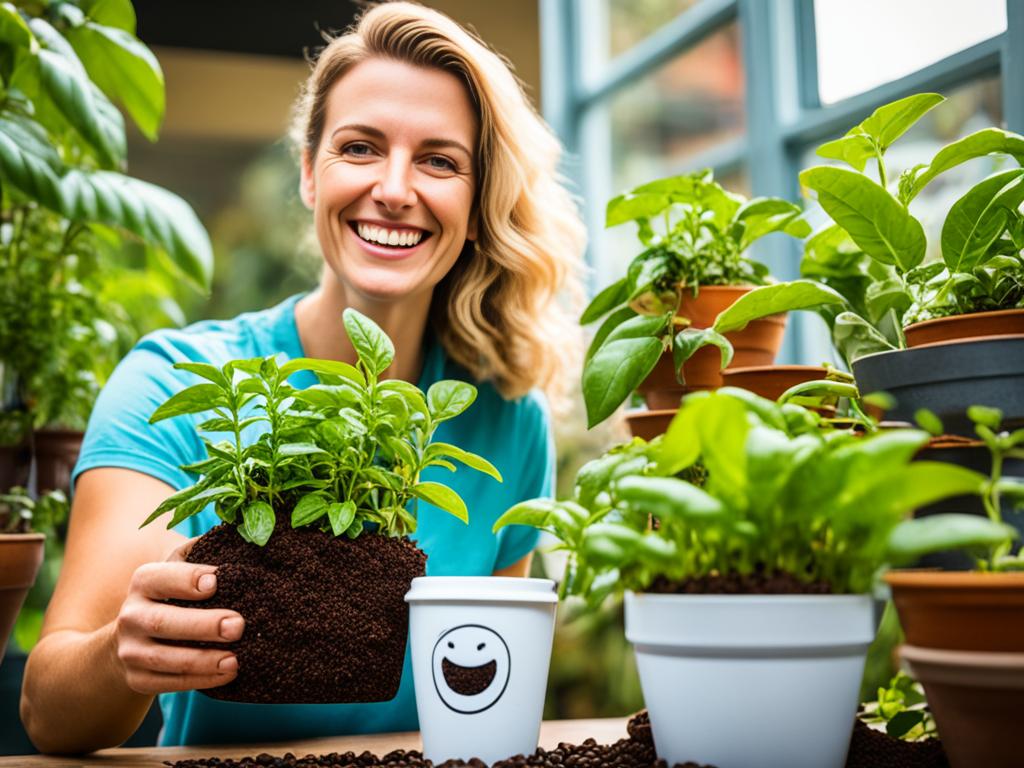
What to Do with Old Coffee Beans as Natural Pesticides
As someone who loves coffee, I’ve found a great use for leftovers: making a natural insect repellent. I discovered that pests don’t like the smell of coffee either. Using old coffee beans can keep mosquitoes, lizards, and cockroaches away, according to research.
Research by García-Moraleja et al. (2015) explained what’s in coffee that affects pests. I started spreading old beans around my patio. The coffee beans worked wonders, keeping pests out. This method is smart and helps the planet too!
There’s more proof that coffee can protect our homes. In 2007, Barragan-Huerta’s study showed coffee beans can break down harmful pesticides. This means coffee can naturally guard and clean our environment.
- Place coffee grounds in bowls around the house.
- Sprinkle dried beans around outdoor areas.
- Blend grounds into a natural spray for garden use.
Being creative with coffee has been rewarding. I’ve turned waste into an eco-friendly pest solution. So, think twice before throwing out those coffee beans. They could be your very own natural pest control. Enjoying a bug-free home feels great!
Revitalizing Your Garden with Coffee-Based Fertilizers
Ever wonder what to do with old coffee beans? It turns out that your morning brew’s leftovers could be the boost your garden needs. By using old coffee beans, you’re being eco-friendly and enhancing your garden’s health without using chemical fertilisers.
Let’s explore how these coffee byproducts can make your garden thrive.
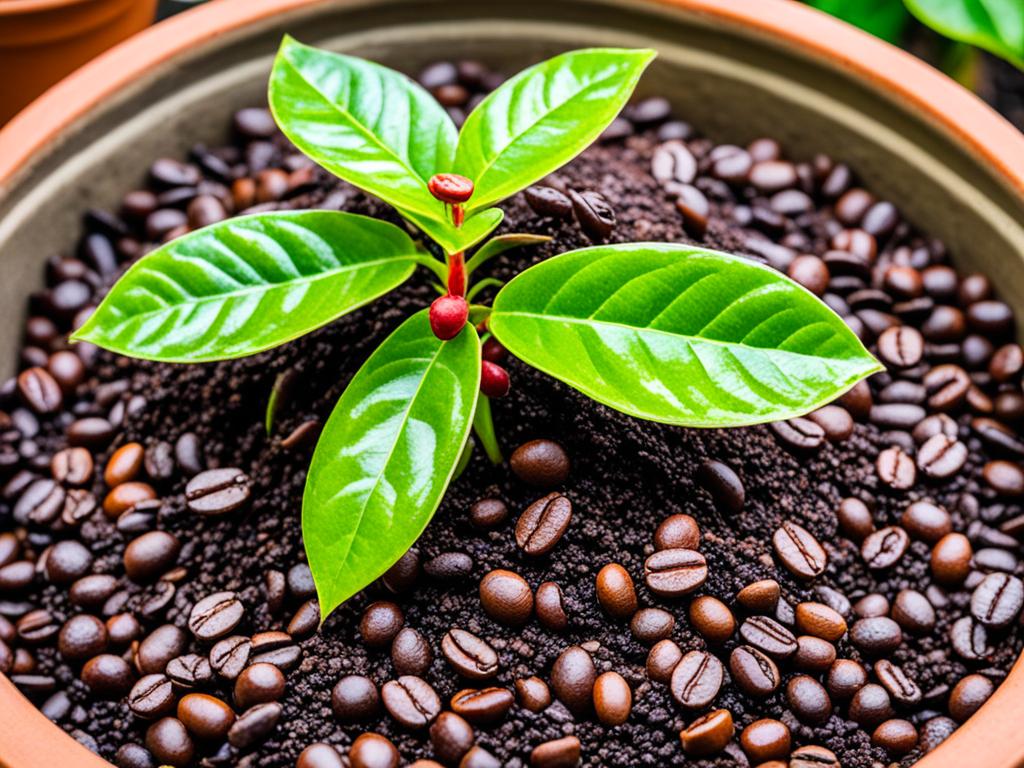
Coffee Grounds as Nutrient-Rich Soil Amendments
For those with a green thumb looking for sustainable ideas, spent coffee grounds are valuable. They help with drainage, water retention, and soil aeration.
Plus, they’re a nitrogen source, crucial for plant growth. Just remember to avoid using them in large clumps to keep water flowing smoothly. Here’s how you can use coffee grounds to help your garden:
| Plant Type | Benefit | Application Tips |
|---|---|---|
| Acid-Loving Plants | Enhanced Growth | Apply directly to the soil around rhododendrons, azaleas, and hydrangeas. |
| Vegetables | Boosts Nitrogen Levels | Mix into compost for blueberries, spinach, and other nitrogen-loving veggies. |
| Seedlings & Weeds | Natural Deterrent | Scatter lightly to deter unwanted seedlings and weeds. |
Composting with Coffee for a Greener Garden
Old coffee grounds are great for compost because they add nitrogen. But it’s important to mix them with ‘brown’ materials, like dried leaves. This balance helps your compost break down well.
And be careful not to add too many grounds to your worm compost. Moderation is the key to a healthy compost pH level. Follow these tips for a productive garden.
- Avoid chemically flavoured grounds, which may harm your compost’s natural composition.
- Compost coffee filters should be unbleached to maintain the integrity of your organic waste.
- Mix coffee grounds in with your regular brown composting materials to enhance nitrogen levels.
Embracing old coffee beans in your garden is a smart move. Every morning’s coffee can help make your garden beautiful in the afternoon. It’s a sustainable cycle that leads to a thriving garden.
Plus, it feels good to make a green choice.
Can Old Coffee Beans Still Be Used If They Are Unroasted?
Unroasted coffee beans can be used even when they’re not fresh, provided they have been stored properly. Effective unroasted coffee storage prevents moisture, pests, and light exposure, allowing the beans to maintain their quality longer. When properly stored, they can be roasted anytime, delivering a flavorful brew.
From Beans to Beauty: Coffee in Skin Care Routines
I’m always looking for new ways to boost my skin care routine. Recently, I found out coffee is more than a morning wake-up call; it’s great for the skin too. Coffee has over 100 times more antioxidants than green tea and kale.
This makes it a star in beauty products, thanks to its chlorogenic acid (CGA), which battles skin-damaging free radicals. So, it’s no wonder that coffee-based beauty products are becoming more popular.
Creating Exfoliating Coffee Scrubs for the Body
DIY projects with used coffee beans have become key to my beauty care. Making homemade scrubs is a fun project. Caffeine, by promoting blood flow, helps make the skin look firmer. A coffee body scrub can keep my skin tight for up to 16 hours.
I always apply a decent moisturiser after using it to avoid any dryness from the caffeine.
Natural dye: using coffee to colour and patch
I’ve also used old coffee beans for things other than scrubs and masks. Coffee is a natural dye that can colour fabric or touch up wood furniture.
I’m careful to use fine grounds on my skin to avoid scratches, especially on delicate facial areas.
Crafty and Sustainable Art with Coffee Beans
I love adding coffee to my art projects. It makes them unique and eco-friendly. Using coffee in skincare isn’t just about looking good. I enjoy its skin benefits, like less cellulite and fewer sunspots.
But I’m also happy to support the use of sustainable ingredients through efforts like InnCoCells and Prolific. It’s caring for beauty and the planet at the same time.
FAQ
Can I still use coffee beans after their expiration date?
Yes, after their expiration date, you can still use coffee beans. They’re safe, but they may taste weaker.
How can old coffee beans be used around the home?
Use old coffee beans for DIY projects. They work as natural insect repellents and fabric dyes. They also make great exfoliating scrubs for beauty routines.
What are the best ways to repurpose coffee beans for gardening?
In the garden, use coffee beans to make fertiliser or add them to compost. This boosts soil nutrients and helps your garden grow.
Do coffee beans go bad, and how can I tell?
Coffee beans lose flavour after a month of roasting. They don’t become unsafe, but they are less flavorful. If it’s less aromatic, it’s past its peak.
What nutrients do old coffee beans and grounds contain?
Old coffee grounds have nitrogen, calcium, and other minerals. These are great for plants and other reuse options.
How do I use coffee beans as a natural insect repellent?
To repel pests, place coffee grounds in bowls or sprinkle them around. Many insects dislike the smell of coffee.
What benefits do coffee grounds offer to the soil?
Coffee grounds enrich the soil with nutrients. They improve soil structure, attract worms, and help retain water.
Can I add coffee grounds directly to my compost pile?
Yes, add coffee grounds to the compost. They add nitrogen and attract worms. This makes your compost richer.
How can I use coffee grounds in my skin care routine?
Use coffee grounds as an exfoliant in scrubs. They remove dead skin, leaving your skin smooth and refreshed.
Can I use coffee as a natural dye or for repairing wood surfaces?
Indeed, use coffee to dye fabrics or hide scratches on wood. It gives wood a darker colour.
How can I incorporate coffee beans into my DIY crafts?
Coffee beans are great for crafts. Create mosaics, decorate candles, or fill jars for a unique display.

